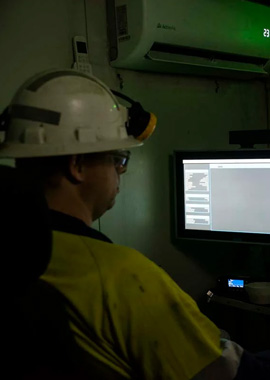Geotechnical engineering
Geotechnical engineering
Geotechnical engineers or engineering geologists investigate, design and monitor mining excavations. They are also involved with the construction of waste dumps and stockpiles and the placement of backfill.
Key tasks
- Develop models of the major geologic structures and geotechnical features of a mine
- Provide information to mine management on the effect current mining practices are having on ground stability issues
- Recommend or undertake rock property testing and sample selection
- Interpret data from instrumentation e.g. ground movements
- Compile databases and reports on rock mass parameters
- Review, update and optimise geotechnical design guidelines for mine planning requirements
Skills and attributes
- Working as part of a multidisciplinary team
- Strong background in science and mathematics
- Analytical and problem-solving skills
- Strategic thinking related to the overall operation of the mine
A typical day
- Geotechnical engineers can expect to work on a fly-in/fly-out (FIFO) or drive-in/drive-out (DIDO) roster at a remote mine site. They are usually part of and provide direction to the technical services team and have a working knowledge of all aspects of the operation.
Role types
- Geotechnical Engineer (Open Pit and Underground): Design, install, use and maintain geotechnical instrumentation to assess the response of the rock mass to mining activities, and interpret and report on that data.
- Geotechnical Engineer (Consultant): Consult on both underground and open pit projects. They will often be based in cities and fly or drive to their projects as required.
- Geotechnical Engineer (Computing/Modelling): Design and apply computer programs and models to characterise and predict rock and ground behaviour, including stress regimes and rock strength.
- Geotechnical Engineer (Academic/Research): Investigate why and how things behave the way they do or are the way they are, rather than the economic issues of how to mine.
Nature of work
- Fly-in/fly-out (FIFO) or drive-in/drive-out (DIDO) roster
- Standard office hours if you join a city-based consultancy and are working in the office
- Expect to spend much of your early career at (often remote) operating sites
Travel
- High likelihood to travel both domestically and internationally, even with a city-based position
